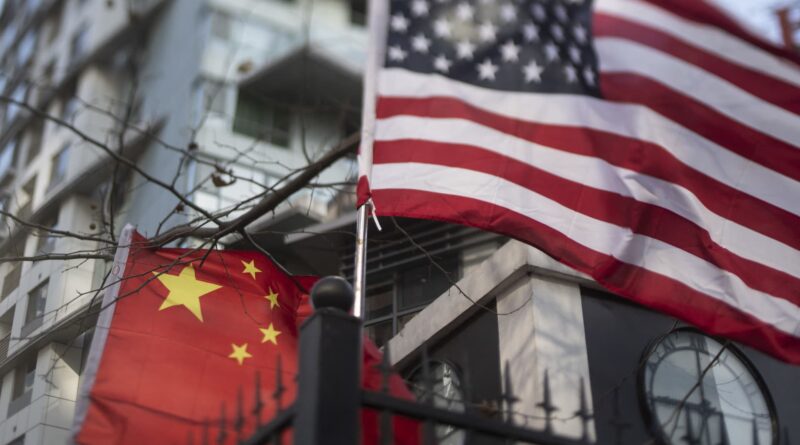U.S. review of China tariffs won’t depend on trade ‘breakthrough:’ deputy U.S. trade representative
[ad_1]
A Chinese and US national flag hang on a fence at an international school in Beijing on December 6, 2018. (Photo by Fred DUFOUR / AFP) (Photo by FRED DUFOUR/AFP via Getty Images)
Fred Dufour | Afp | Getty Images
The United States is taking an analytical approach to its review of whether to keep tariffs on Chinese goods in place and will not base outcomes on any “breakthrough” in U.S.-China trade relations, Deputy U.S. Trade Representative Sarah Bianchi told Reuters.
The Biden administration is not assuming any such breakthrough will happen, but will continue dialogue with China at various levels, Bianchi said in an interview on Saturday as a ministerial meeting of the U.S.-led Indo Pacific Economic Framework talks wrapped up.
“We are conducting the review from an analytical perspective. We’re not base-casing any breakthrough in the trade relationship” with China as part of the review, Bianchi said. “We’re not assuming that that will happen.”
Instead, USTR is continuing to study industry and stakeholder comments on the duties consulting with the U.S. Commerce Department, the Treasury and other agencies to determine which categories make strategic sense, she said.
“We’re taking a look at what’s economically sound,” added Bianchi, who oversees USTR’s engagement in Asia.
Former U.S. President Donald Trump imposed the tariffs in 2018 and 2019 on thousands of imports from China valued at some $370 billion at the time, after a “Section 301” investigation found that China was misappropriating U.S. intellectual property and coercing U.S. companies to transfer sensitive technology to do business.
The duties currently range from 7.5% on many consumer goods to 25% on vehicles, industrial components, semiconductors and other electronics. Among the major categories that escaped tariffs were cellphones, laptop computers and videogame consoles.
The review was required by Section 301 of the Trade Act of 1974 four years after the tariffs were first imposed and it started with initial notification steps in May 2022. Bianchi declined to say when the review would be completed, but added that this was “reasonable” by the end of 2023.
Tariff exclusions on 352 import categories from China were extended by USTR at the end of 2022 for another nine months and are now set to expire on Sept. 30. Some trade experts in Washington view that date as a possible decision point in the tariff review.
Inflation arguments
As the review got underway last May, some Biden administration officials argued in favor of lifting some of the tariffs as the Biden administration struggled to contain high inflation.
U.S. Treasury Secretary Janet Yellen that eliminating “non-strategic” tariffs would reduce costs for specific goods, while Trade Representative Katherine Tai argued that the duties represent “significant leverage” over China.
Bianchi noted that inflation-related discussions over the tariffs have died down as inflation has eased.
Chinese Commerce Minister Wang Wentao raised objections the Section 301 tariffs as an issue of concern during a meeting with Tai in Detroit on the sidelines of an Asia Pacific Economic Cooperation trade meeting.
Wang’s meeting with Tai and Commerce Secretary Gina Raimondo the day before were the first cabinet-level exchanges between Washington and Beijing in months amid a series of trade and national security setbacks, including the U.S. downing of a Chinese spy balloon that transited the continental U.S.
Bianchi said it was important to the global economy for the U.S. and China to maintain a healthy dialogue, even if they disagree.
“These are the two largest economies in the world and we need to be talking at different levels, even if they’re difficult conversations,” she said.
“On trade right now, there aren’t many similar perspectives,” she said of the U.S. and China. “I’m not sure where it will lead, but I think the conversations will continue to be a difficult, but I think it’s important that we have them.”
[ad_2]
Source link


